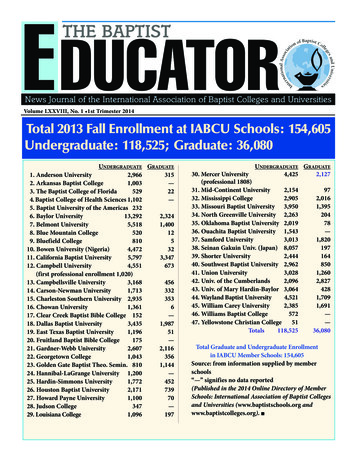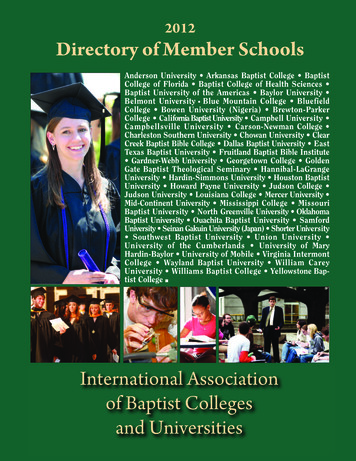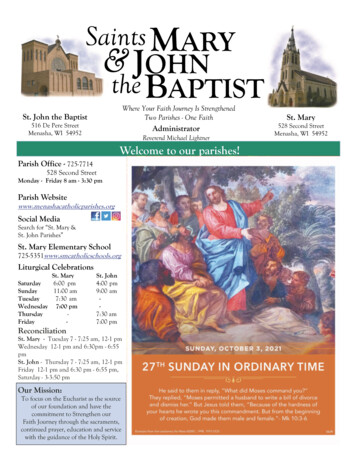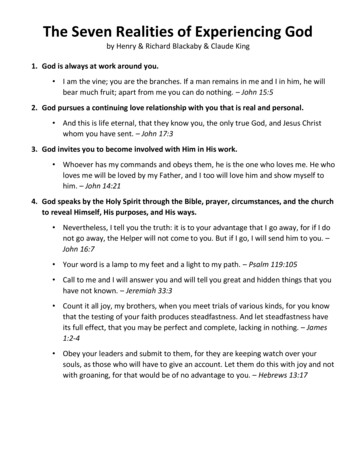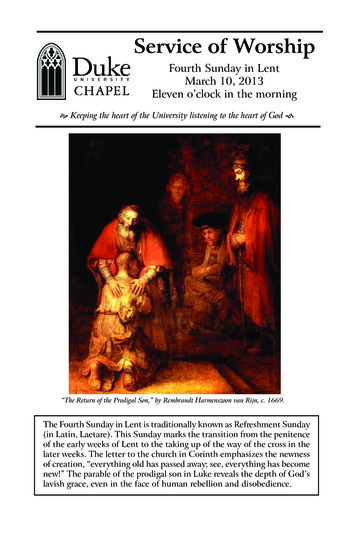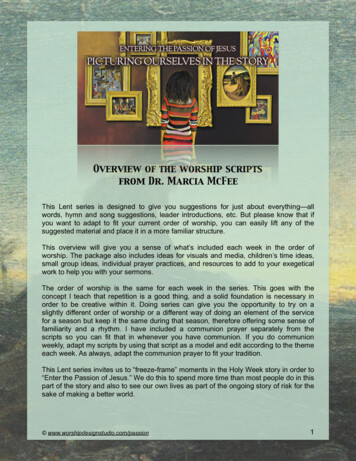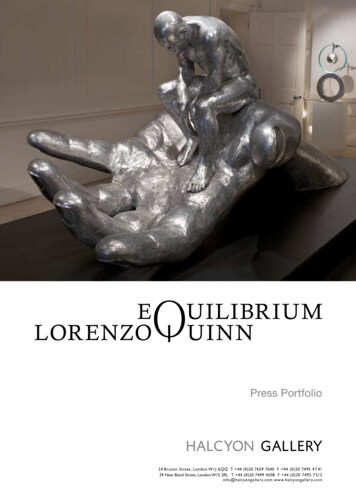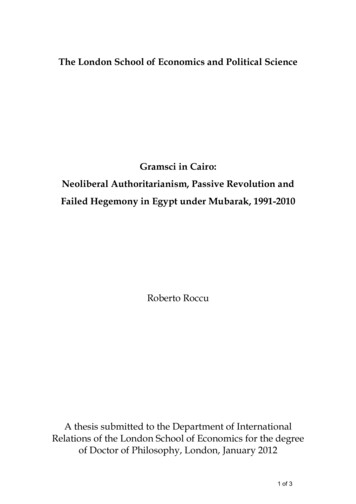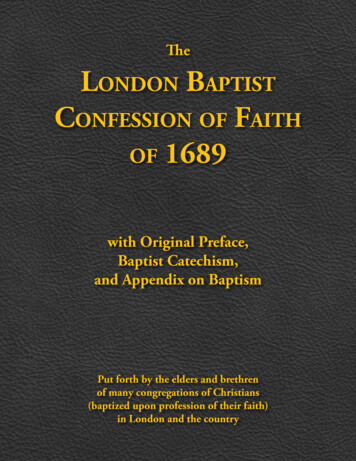
Transcription
TheLondon BaptistConfession of Faithof 1689with Original Preface,Baptist Catechism,and Appendix on BaptismPut forth by the elders and brethrenof many congregations of Christians(baptized upon profession of their faith)in London and the country
THE LONDON BAPTIST CONFESSIONContentsPREFACE . 3THE LONDON BAPTIST CONFESSION OF 16891. Of the Holy Scriptures . 72. Of God and Of the Holy Trinity . 93. Of God’s Decree . 104. Of Creation . 115. Of Divine Providence . 126. Of the Fall of Man, of Sin, and of the Punishment Thereof . 137. Of God’s Covenant . 148. Of Christ the Mediator . 159. Of Free Will . 1710. Of Effectual Calling . 1811. Of Justification . 1912. Of Adoption . 2013. Of Sanctification . 2014. Of Saving Faith . 2115. Of Repentance unto Life and Salvation . 2216. Of Good Works . 2317. Of the Perseverance of the Saints . 2418. Of the Assurance of Grace and Salvation. 2519. Of the Law of God . 2620. Of the Gospel, and Of the Extent of the Grace Thereof . 2821. Of Christian Liberty and Liberty of Conscience . 2922. Of Religious Worship and the Sabbath Day . 3023. Of Lawful Oaths and Vows. 3124. Of the Civil Magistrate . 3225. Of Marriage. 3326. Of the Church . 3327. Of the Communion of Saints . 3628. Of Baptism and the Lord’s Supper . 3729. Of Baptism . 3730. Of the Lord’s Supper . 3731. Of the State of Man after Death and Of the Resurrection . 3932. Of the Last Judgment . 39THE BAPTIST CATECHISM . 42APPENDIX 1: ON BAPTISM . 58APPENDIX 2: HISTORICAL BACKGROUND . 69
The London Baptist Confession with Original Preface, Baptist Catechism, and Appendix on Baptism (itemcode lbcw) includes the complete London Baptist Confession of Faith of 1689 and three other historicaldocuments: the original preface to the Confession, an important appendix on credo-baptism, and TheBaptist Catechism (1693), for use in teaching Baptist congregations the doctrines of the Confession.This catechism was updated by Charles Spurgeon (1834-1892) for use with his own congregation,which is available from Chapel Library separately as Spurgeon’s Catechism (item code scat). ErrollHulse simplified this for children and families, which is available as A Catechism for Boys and Girls(item code cfba) from Chapel Library. The London Baptist Confession of Faith – 1689 with only the textof the confession itself (item code lbco) also is available from Chapel Library as a more concise booklet. Copyright 2016 Chapel Library: compilation, annotations. Original texts are in the public domain.Printed in the USA. All Scripture quotations are from the King James Version. Chapel Library doesnot necessarily agree with all the doctrinal positions of the authors it publishes. Permission is expressly granted to reproduce this material by any means, provided1) you do not charge beyond a nominal sum for cost of duplication, and2) this copyright notice and all the text on this page are included.Chapel Library sends Christ-centered materials from prior centuries worldwide without charge, relying entirely upon God’s faithfulness. We therefore do not solicit donations, but we gratefully receivesupport from those who freely desire to give.Worldwide, please download material without charge from our website, or contact the internationaldistributor as listed there for your country.In North America, for additional copies of this booklet or other Christ-centered materials from priorcenturies, please contactCHAPEL LIBRARY2603 West Wright StreetPensacola, Florida 32505 USAPhone: (850) 438-6666 Fax: (850) 438-0227chapel@mountzion.org www.ChapelLibrary.orgA study guide for the Confession also is available from Mount Zion Bible Institute at the same addressor website, or school@mountzion.org.You also may be interested in the Free Grace Broadcaster from Chapel Library. The FGB is a quarterlydigest of six to ten messages from prior centuries, all on one theme, with a different theme each issue,including doctrinal, family, and discipleship themes such as Justification, Substitution, Christ theMediator, The Gospel, Family Worship, Biblical Parenthood, Marriage, Sanctification, Backsliding,and Self-denial. Request a subscription– worldwide, eBook sent via iptions/– in North America, printed copy sent via mail: write Chapel Library– in a country with an international distributor, printed copy sent via mail; write to them tributors/
PREFACETo the judicial and impartial reader—1677PurposeCourteous Reader: It is now many years 1 since divers 2 of us (with other sober Christians then living and walking in the way of the Lord that we profess) did conceive ourselves to be under a necessity of publishing a confession of our faith, for the informationand satisfaction of those that did not thoroughly understand what our principles were,or had entertained prejudices against our profession, by reason of the strange representation of them by some men of note who had taken very wrong measures, and accordingly led others into misapprehension of us and them. This was first put forth about theyear 1643 in the name of seven congregations then gathered in London. Since whichtime, divers impressions thereof have been dispersed abroad, and our end proposed ingood measure answered, inasmuch as many (and some of those men eminent both forpiety and learning) were thereby satisfied that we were no way guilty of those heterodox3ies and fundamental errors which had too frequently been charged upon us, withoutground or occasion given on our part.And forasmuch as that Confession is not now commonly to be had, and also thatmany others have since embraced the same truth which is owned therein, it was judgednecessary by us to join together in giving a testimony to the world of our firm adheringto those wholesome principles by the publication of this which is now in your hand. Andforasmuch as our method and manner of expressing our sentiments in this doth varyfrom the former (although the substance of this matter is the same), we shall freely impart to you the reason and occasion thereof. One thing that greatly prevailed with us toundertake this work was not only to give a full account of ourselves to those Christiansthat differ from us about the subject of baptism, but also the profit that might fromthence arise unto those that have any account of our labors in their instruction and establishment in the great truths of the gospel, in the clear understanding and steady belief of which our comfortable walking with God, and fruitfulness before Him in all our123In 1677, it had been 33 years since a former London Confession had been issued (in 1644) by sevenBaptist congregations in London. That document had been drawn up to distinguish the ParticularBaptist churches (who followed the historic evangelical faith of the Reformation) from the Anabaptists and the newly forming Arminian Baptists.divers – several.heterodoxies – teachings not in accordance with established or accepted doctrines; unorthodox doctrines.
4THE LONDON CONFESSIONways, is most nearly concerned. Therefore, we did conclude it necessary to express ourselves the more fully and distinctly, and also to fix on such a method as might be mostcomprehensive of those things we designed to explain our sense and belief of.The Westminster AssemblyFinding no defect in this regard in that fixed on by the Assembly, 4 and after them bythose of the Congregational way, 5 we did readily conclude it best to retain the same order in our present Confession. Also, when we observed that those last mentioned did intheir confessions (for reasons which seemed of weight both to themselves and others)choose not only to express their mind in words concurrent with the former in senseconcerning all those articles wherein they were agreed, but also for the most part without any variation of the terms, we did in like manner conclude it best to follow their example in making use of the very same words with them both in these articles (which arevery many) wherein our faith and doctrine are the same with theirs. This we did themore abundantly to manifest our consent with both in all the fundamental articles of theChristian religion, as also with many others whose orthodox Confessions have been published to the world on the behalf of the Protestant in diverse nations and cities—and alsoto convince all that we have no itch to clog religion with new words, but do readily acquiesce in that form of sound words which hath been, in consent with the Holy Scriptures, used by others before us; hereby declaring, before God, angels, and men, ourhearty agreement with them in that wholesome Protestant doctrine which, with so clearevidence of Scriptures, they have asserted. Some things, indeed, are in some places added, some terms omitted, and some few changed; but these alterations are of that natureas that we need not doubt any charge or suspicion of unsoundness in the faith from anyof our brethren upon the account of them.Small DifferencesIn those things wherein we differ from others, we have expressed ourselves with allcandor and plainness, that none might entertain jealousy of aught secretly lodged in ourbreasts that we would not the world should be acquainted with. Yet, we hope we havealso observed those rules of modesty and humility as will render our freedom in this respect inoffensive, even to those whose sentiments are different from ours.We have also taken care to affix texts of Scripture at the bottom, for the confirmationof each article in our Confession, in which work we have studiously endeavored to selectsuch as are most clear and pertinent for the proof of what is asserted by us. Our earnestdesire is that all into whose hands this may come would follow that (never enough45Westminster Assembly of Divines (1643) – assembly of 121 theologians appointed by the “Puritan”Long Parliament to make proposals for reforming the Church of England; it produced the Westminster Confession (1647), the Larger and Shorter Catechisms, the Directory for Public Worship, and the Formof Church Government.An assembly of Congregational theologians and ministers met in 1658 to draft a confession of faithfor the Congregational churches, known as the Savoy Declaration. It is like the Westminster Confessionexcept for the article on church government.
Preface5commended) example of the noble Bereans, who searched the Scriptures daily that theymight find out whether the things preached to them were so or not (Act 17:11).Avoiding Unnecessary ContentionThere is one thing more which we sincerely profess and earnestly desire credence in,viz., 6 that contention is most remote from our design in all that we have done in thismatter. We hope that the liberty of an ingenuous 7 unfolding our principles and openingour hearts unto our brethren, with the Scripture grounds of our faith and practice, willby none of them be either denied to us or taken ill from us. Our whole design is accomplished if we may have attained that justice, as to be measured in our principles andpractice, and the judgment of both by others, according to what we have now published,which the Lord (Whose eyes are as a flame of fire) knoweth to be the doctrine which withour hearts we most firmly believe and sincerely endeavor to conform our lives to.And oh, that—other contentions being laid asleep—the only care and contention ofall upon whom the name of our blessed Redeemer is called, might for the future be towalk humbly with their God in the exercise of all love and meekness toward each other;to perfect holiness in the fear of the Lord, each one endeavoring to have his conversationsuch as becometh the gospel. And also, suitable to his place and capacity, vigorously topromote in others the practice of true religion and undefiled in the sight of God our Father! And that, in this backsliding day, we might not spend our breath in fruitless complaints of the evils of others, but may every one begin at home, to reform in the firstplace our own hearts and ways, and then to quicken all that we may have influence uponto the same work: that if the will of God were so, none might deceive themselves by resting in and trusting to a form of godliness without the power of it, and inward experienceof the efficacy of those truths that are professed by them.Family WorshipVerily, there is one spring and cause of the decay of religion in our day which we cannot but touch upon and earnestly urge a redress of, and that is the neglect of the worship of God in families by those to whom the charge and conduct of them is committed. 8May not the gross ignorance and instability of many, with the profaneness of others, bejustly charged upon their parents and masters, who have not trained them up in the waywherein they ought to walk when they were young, but have neglected those frequentand solemn commands which the Lord hath laid upon them, so to catechise 9 and instruct them that their tender years might be seasoned with the knowledge of the truth ofGod as revealed in the Scriptures—and also by their own omission of prayer and otherduties of religion of their families, together with the ill example of their loose conversa-6789viz. – Latin: videlicet; “that is to say”; “namely.”ingenuous – honest; honorably straightforward.See Free Grace Broadcaster 188, Family Worship; and Family Worship by Merle D’Aubigne (17941872); both available from CHAPEL LIBRARY.catechise – to instruct orally by means of questions and answers.
6THE LONDON CONFESSIONtion, 10 having inured 11 them first to a neglect and the contempt of all piety and religion.We know this will not excuse the blindness and wickedness of any, but certainly it willfall heavy upon those that have been thus the occasion thereof. They indeed die in theirsins; but will not their blood be required of those under whose care they were, who yetpermitted them to go on without warning—yea, led them into the paths of destruction?And will not the diligence of Christians with respect to the discharge of these duties inages past rise up in judgment against and condemn many of those who would be esteemed such now?ConclusionWe shall conclude with our earnest prayer that the God of all grace will pour outthose measures of His Holy Spirit upon us, that the profession of truth may be accompanied with the sound belief and diligent practice of it by us, that His name may in allthings be glorified through Jesus Christ our Lord. Amen. 1011conversation – conduct; way of life.inured – hardened.
THE LONDON BAPTISTCONFESSION OF 1689Chapter 1Of the Holy Scriptures1The Holy Scripture is the only sufficient, certain, and infallible arule of all savingbknowledge, faith, and obedience, although the light of nature, and the works of creationand providence do so far manifest the goodness, wisdom, and power of God, as to leavemen inexcusable; yet are they not sufficient to give that knowledge of God and his willwhich is necessary unto salvation. c Therefore it pleased the Lord at sundry times and indivers manners to reveal himself, and to declare that his will unto his church; and afterward for the better preserving and propagating of the truth, and for the more sure establishment and comfort of the church against the corruption of the flesh, and the malicedof Satan, and of the world, to commit the same wholly unto writing; which maketh theHoly Scriptures to be most necessary, those former ways of God’s revealing his will untohis people being now ceased.( a 2Ti 3:15-17; Isa 8:20; Luk 16:29,31; Eph 2:20; b Rom 1:19-21; 2:14-15;cdPsa 19:1-3; Heb 1:1; Pro 22:19-21; Rom 15:4; 2Pe 1:19-20)2Under the name of Holy Scripture, or the Word of God written, are now contained allthe books of the Old and New Testaments, which are these:Of the Old TestamentGenesis, Exodus, Leviticus, Numbers, Deuteronomy, Joshua, Judges, Ruth, 1 & 2 Samuel, 1& 2 Kings, 1 & 2 Chronicles, Ezra, Nehemiah, Esther, Job, Psalms, Proverbs, Ecclesiastes,Song of Solomon, Isaiah, Jeremiah, Lamentations, Ezekiel, Daniel, Hosea, Joel, Amos, Obadiah, Jonah, Micah, Nahum, Habakkuk, Zephaniah, Haggai, Zechariah, Malachi.Of the New TestamentMatthew, Mark, Luke, John, Acts, Romans, 1 & 2 Corinthians, Galatians, Ephesians, Philippians, Colossians, 1 & 2 Thessalonians, 1 & 2 Timothy, Titus, Philemon, Hebrews, James, 1& 2 Peter, 1, 2, & 3 John, Jude, Revelation.All of which are given by the einspiration of God to be the rule of faith and life.3:16)( e 2Ti
8THE LONDON CONFESSION3The books commonly called Apocrypha, not being of fdivine inspiration, are no partof the canon or rule of the Scripture, and, therefore, are of no authority to the church ofGod, nor to be any otherwise approved or made use of than other human writings. ( f Luk24:27,44; Rom 3:2)4The authority of the Holy Scripture, for which it ought to be believed, dependeth notupon the testimony of any man or church, but wholly upon gGod (who is truth itself),the author thereof; therefore it is to be received because it is the Word of God. ( g 2Pe1:19-21; 2Ti 3:16; 2Th 2:13; 1Jo 5:9)5We may be moved and induced by the testimony of the church of God to an high andreverent esteem of the Holy Scriptures; and the heavenliness of the matter, the efficacyof the doctrine, and the majesty of the style, the consent of all the parts, the scope of thewhole (which is to give all glory to God), the full discovery it makes of the only way ofman’s salvation, and many other incomparable excellencies, and entire perfectionsthereof, are arguments whereby it doth abundantly evidence itself to be the Word of God;yet notwithstanding, our hfull persuasion and assurance of the infallible truth, and divineauthority thereof, is from the inward work of the Holy Spirit bearing witness by and withthe Word in our hearts.( h Joh 16:13-14; 1Co 2:10-12; 1Jo 2:20,27)6The whole counsel of God concerning all things inecessary for his own glory, man’ssalvation, faith, and life, is either expressly set down or necessarily contained in the HolyScripture: unto which nothing at any time is to be added, whether by new revelation ofthe Spirit, or traditions of men.Nevertheless, we acknowledge the inward k illumination of the Spirit of God to benecessary for the saving understanding of such things as are revealed in the Word, andthat there are some circumstances concerning the worship of God, and government ofthe church, common to human actions and societies, which are to be lordered by thelight of nature and Christian prudence, according to the general rules of the Word,which are always to be observed.( i2Ti 3:15-17; Gal 1:8-9; kJoh 6:45; 1Co 2:9-12; l1Co 11:13-14; 14:26,40)7All things in Scripture are not alike mplain in themselves, nor alike clear unto all; yetthose things which are necessary to be known, believed and observed for salvation, are sonclearly propounded and opened in some place of Scripture or other, that not only thelearned, but the unlearned, in a due use of ordinary means, may attain to a sufficientunderstanding of them. (m2Pe 3:16; n Psa 19:7; 119:130)8The Old Testament in o Hebrew (which was the native language of the people of Godof old), and the New Testament in Greek (which at the time of the writing of it was mostgenerally known to the nations), being immediately inspired by God, and by his singularcare and providence kept pure in all ages, are therefore pauthentic; so as in all controver-
Confession of Faith of 16899sies of religion, the church is finally to appeal to them. q But because these originaltongues are not known to all the people of God, who have a right unto, and interest inthe Scriptures, and are commanded in the fear of God to read rand search them, therefore they are to be translated into the vulgar language of every nation unto which they stcome, that the Word of God dwelling plentifully in all, they may worship him in an acceptable manner, and through patience and comfort of the Scriptures may have hope.(oRom 3:2; p Isa 8:20; qAct 15:15; rJoh 5:39; s 1Co 14:6,9,11-12,24,28; tCol 3:16)9The infallible rule of interpretation of Scripture is the uScripture itself; and thereforewhen there is a question about the true and full sense of any Scripture (which is notmanifold, but one), it must be searched by other places that speak more clearly. ( u 2Pe1:20-21; Act 15:15-16)10The supreme judge, by which all controversies of religion are to be determined, andall decrees of councils, opinions of ancient writers, doctrines of men, and private spirits,are to be examined, and in whose sentence we are to rest, can be no other but the HolyScripture delivered by the Spirit, into which xScripture so delivered, our faith is finallyresolved.x( Mat 22:29,31-32; Eph 2:20; Act 28:23)Chapter 2Of God and Of the Holy Trinity1The Lord our God is but aone only living and true God; whose bsubsistence is in andof himself, cinfinite in being and perfection; whose essence cannot be comprehended bydeany but himself; a most pure spirit, invisible, without body, parts, or passions, who onlyfhath immortality, dwelling in the light which no man can approach unto; who is immutable, gimmense, heternal, incomprehensible, ialmighty, every way infinite, kmost holy,most wise, most free, most absolute; lworking all things according to the counsel of hisown immutable and most righteous will mfor his own glory; most loving, gracious, merciful, long-suffering, abundant in goodness and truth, forgiving iniquity, transgression,and sin; nthe rewarder of them that diligently seek him, and withal most just oand terrible in his judgments, p hating all sin, and who will by no means clear the qguilty.( a 1Co 8:4,6; Deu 6:4; bJer 10:10; Isa 48:12; c Exo 3:14; dJoh 4:24; e1Ti 1:17;fghikDeu 4:15-16; Mal 3:6; 1Ki 8:27; Jer 23:23; Psa 90:2; Gen 17:1; Isa 6:3;lmnPsa 115:3; Isa 46:10; Pro 16:4; Rom 11:36; Exo 34:6-7; Heb 11:6;oNeh 9:32-33; p Psa 5:5-6; q Exo 34:7; Nah 1:2-3)2God, having all r life, sglory, tgoodness, blessedness, in and of himself, is alone in andunto himself all-sufficient, not ustanding in need of any creature which he hath made,nor deriving any glory from them, but only manifesting his own glory in, by, unto, and
10THE LONDON CONFESSIONupon them; he is the alone fountain of all being, xof whom, through whom, and to whomare all things, and he hath most sovereign ydominion over all creatures, to do by them,for them, or upon them, whatsoever himself pleaseth; in his sight zall things are openand manifest; his knowledge is ainfinite, infallible, and independent upon the creature, sobas nothing is to him contingent or uncertain; he is most holy in all his counsels, in allchis works, and in all his commands; to him is due from angels and men, whatsoeverworship, service, or obedience, as creatures they owe unto the Creator, and whatever heis further pleased to require of them.y( r Joh 5:26; s Psa 148:13; t Psa 119:68; uJob 22:2-3; x Rom 11:34-36;Dan 4:25,34-35; z Heb 4:13; a Eze 11:5; Act 15:18; b Psa 145:17; c Rev 5:12-14)3In this divine and infinite Being there are three subsistences, dthe Father, the Wordor Son, and Holy Spirit, of one substance, power, and eternity, each having the wholedivine essence, eyet the essence undivided: the Father is of none, neither begotten norproceeding; the Son is feternally begotten of the Father; the Holy Spirit gproceeding fromthe Father and the Son; all infinite, without beginning, therefore but one God, who isnot to be divided in nature and being, but distinguished by several peculiar relative properties and personal relations; which doctrine of the Trinity is the foundation of all ourcommunion with God, and comfortable dependence on him.( d1Jo 5:7; Mat 28:19; 2Co 13:14; e Exo 3:14; Joh 14:11;fg1Co 8:6; Joh 1:14,18; Joh 15:26; Gal 4:6)Chapter 3Of God’s Decree1God hath adecreed in himself, from all eternity, by the most wise and holy counsel ofhis own will, freely and unchangeably, all things, whatsoever comes to pass; yet so asbthereby is God neither the author of sin nor hath fellowship with any therein; nor is violence offered to the will of the creature, nor yet is the liberty or contingency of secondcauses taken away, but rather cestablished; in which appears his wisdom in disposing allthings, and power and faithfulness din accomplishing his decree.( a Isa 46:10; Eph 1:11; Heb 6:17; Rom 9:15,18; b Jam 1:13; 1Jo 1:5;cAct 4:27-28; Joh 19:11; d Num 23:19; Eph 1:3-5)2Although God knoweth whatsoever may or can come to pass, upon all esupposedconditions, yet hath he not decreed anything, f because he foresaw it as future, or as thatwhich would come to pass upon such conditions.( eAct 15:18; f Rom 9:11,13,16,18)3By the decree of God, for the manifestation of his glory, gsome men and angels arepredestinated, or foreordained to eternal life through Jesus Christ, to the hpraise of his
Confession of Faith of 168911glorious grace; others being left to act in their sin to their ijust condemnation, to thepraise of his glorious justice.( g 1Ti 5:21; Mat 25:34; h Eph 1:5-6; i Rom 9:22-23; Jude 4)4These angels and men thus predestinated and foreordained, are particularly and unchangeably designed, and their knumber so certain and definite, that it cannot be eitherincreased or diminished. ( k 2Ti 2:19; Joh 13:18)5Those of mankind l that are predestinated to life, God, before the foundation of theworld was laid, according to his eternal and immutable purpose, and the secret counseland good pleasure of his will, hath chosen in Christ unto everlasting glory, out of hismere free grace and love, mwithout any other thing in the creature as a condition orcause moving him thereunto. ( l Eph 1:4,9,11; Rom 8:30; 2Ti 1:9; 1Th 5:9; m Rom 9:13,16; Eph2:5,12)6As God hath appointed the elect unto glory, so he hath, by the eternal and most freepurpose of his will, foreordained nall the means thereunto; wherefore they who are elected, being fallen in Adam, oare redeemed by Christ, are effectually pcalled unto faith inChrist, by his Spirit working in due season, are justified, adopted, sanctified, and kept byqhis power through faith unto salvation; neither are any other redeemed by Christ, oreffectually called, justified, adopted, sanctified, and saved, but the elect ronly.( n 1Pe 1:2; 2Th 2:13; o1Th 5:9-10; p Rom 8:30; 2Th 2:13;q1Pe 1:5; rJoh 10:26, 17:9, 6:64)7The doctrine of this high mystery of predestination is to be handled with special prudence and care, that men attending the will of God revealed in his Word, and yieldingobedience thereunto, may, from the certainty of their effectual vocation, be assured oftheir seternal election; so shall this doctrine afford matter tof praise,
The London Baptist Confessionith Original Preface, Baptist Catechism w , and Appendix on Baptism (item code lbcw) includes the complete London Baptist Confession of Faith of 1689 and three other historical documents: the original preface to the Confession, an important appendix on credo-baptism, and The Baptist Cate
